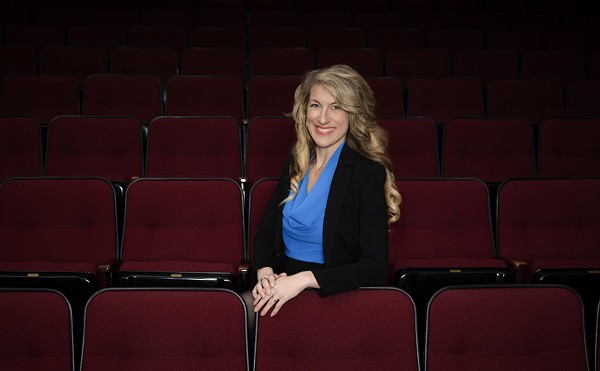Or does it?
David Lowry, chairman of St. Louis' Japanese Activities Committee and organizer of this year's Japanese Festival at the Missouri Botanical Garden (4344 Shaw Boulevard; 314-577-9400), explains: "The cliché, well-worn only because it has been so often and aptly used, portrays Americans as insular in attitude, myopic in their perspective on the international scene, preferring simplistic stereotypes to a multidimensional understanding of other cultures. To be sure, this is often the case."
On the other hand, Lowry continues, "To rely too heavily on the cliché is to ignore some significant aspects of American attitudes that are, in some ways, exemplified by the Japanese Festival and its environs." The fourteen-acre Seiwa-en, for example, is the largest Japanese garden in North America. "Is there an equivalent in Japan of American landscaping or architecture that could compare? The Japanese Disneyland, perhaps," offers Lowry. Plus, his own organization is made up of "no small percentage" of non-Japanese who also have "sufficient affinity to the culture, linguistic competency and the sensitivity to present that culture, traditional and modern, to audiences."
The Japanese Festival opens Saturday, September 4, at 10 a.m. (check www.mobot.org for the complete schedule) and officially begins with the 11 a.m. procession of an omikoshi shrine, a portable dashi stage and bon odori dancing. It concludes Monday, September 6, at 5 p.m. (8 p.m. on Saturday and Sunday). Admission, which includes all activities except daily tea ceremonies, ranges from $3 to $10.
Highlights include samurai martial-arts demonstrations (koryu); Masaji Terasawa, the Candyman, and his sidewalk magic show; and the Hinode Taiko Rising Sun Drummers from Winnipeg, Canada, whose drums, cymbals, gongs and flutes simulate natural water sounds. And for those of you solely interested in the pop variety of Japanese culture, you can watch a re-enactment of the tea scene from The Karate Kid, Part II -- a ceremony called chado -- for an extra $10. Then at 8:30 p.m. on Saturday night, A.J. Trujillo from Star Clipper Comics presents a full-length adult anime film (all Japanese animation ain't Pokémon, so kids have to sit this one out).
"Certainly there will be those at the Japanese Festival whose understanding of Japanese culture tends toward the superficial and simplistic," Lowry concedes, "and whose view of Japan seems to be dominated by pneumatic-breasted, purple-hair anime characters -- I have seen some purple hair in Japan; cleavage of anime proportions is noticeably lacking.
"Look around, though," he continues, "and you will see Americans who demonstrate an appreciation for Japanese culture that is both wide in breadth and extraordinarily deep -- an appreciation that says, in my opinion, something about our own culture as well."





